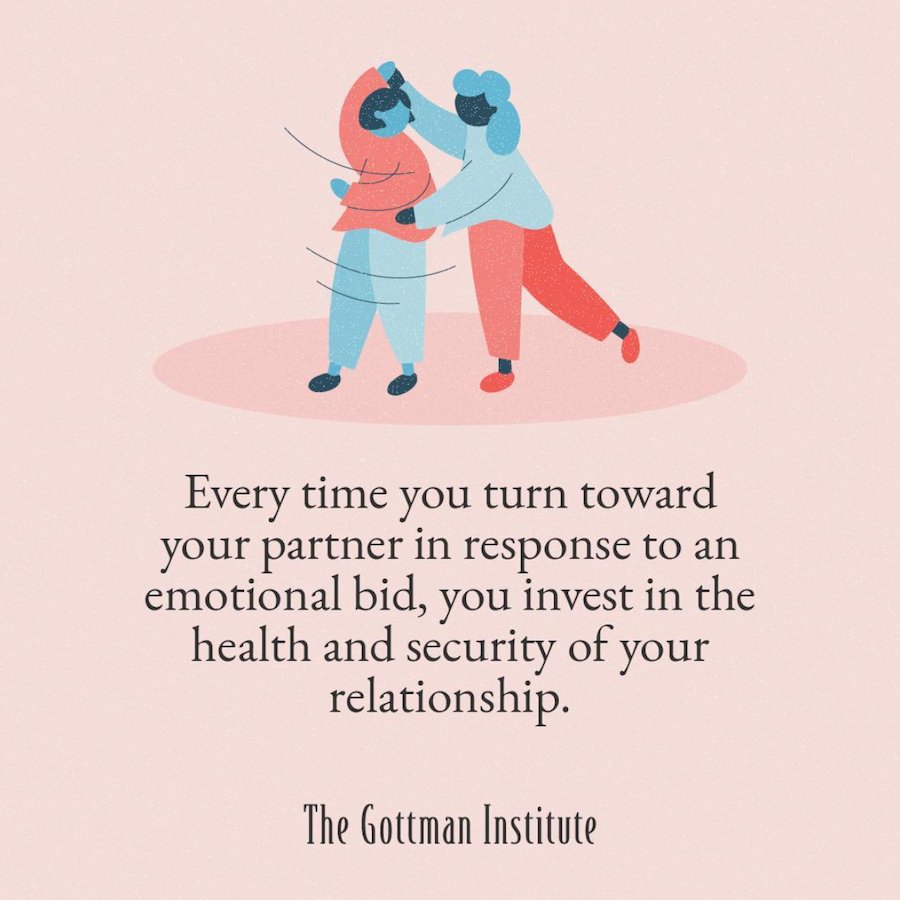This 3-Letter Word Might Save Your Entire Relationship
by Marissa Pomerance
No matter your love language or attachment style, there’s one thing we all need from our romantic partners:
Connection.
Connection is the core reason we even spend time with other humans. Otherwise, what’s the point?
And while this idea seems relatively simple, the chasms of disconnection that inevitably arise from marriage and long-term partnerships are often at the heart of every problem in our relationship: lack of intimacy, resentment, distance, longing.
So of course, when The Gottman Institute, our go-to source for practical, REAL solutions about relationships and marriage, suggests a tactic for better connecting with our spouses, we listen.
And their tactic? It’s called “a bid.”
Ok, what is a “bid”?
According to Gottman Institute trained therapist, Dr. Vagdevi Meunier, a bid is “any gesture, verbal or non-verbal, from one person to another that invites or requests the other person’s attention, response, or engagement.” Essentially, it’s the action we take to try to connect with our partners. Bids can even be subtle changes in body language, and they’re often related to our need for affection or attention in the moment.
Sometimes, these bids are conscious, like when we tell our spouses we’re feeling distant from them, and desperately need a date night, so we make a date in front of the TV to binge seasons 1 and 2 of Succession so we’re caught up for season 3.
Some bids are as simple as making a comment, or sharing information. “If my partner said something like ‘our neighbors have a new dog,’ as he stares out the kitchen window, that would be a low level comment bid. It shares information without necessarily asking for anything more from the recipient. If I grunt back with an ‘uh-huh,’ I have turned towards my partners low level bid with a low level response,” explains Dr. Meunier.
And often, these bids are completely subconscious, like when we grab our partner’s hand across the dinner table while they’re staring at their phone. It’s our subtle way of saying, “pay attention to me.”
“A silent bid can be a non-verbal gesture, such as pointing to something, making facial gestures, or moving our bodies in ways that contain some message. It might be a hug, a pat, a kiss, or other signal that lets my partner know something about how I feel about them or our relationship,” says Dr. Meunier.
Why you should always “turn towards” a bid.
These subconscious, non-verbal, and indirect bids are where things get tricky. Bids can be the subtext expressing our core needs, and more often than not, we end up missing or flat out dismissing them altogether, making our partners feel even LESS connected, distant, and rejected.
It’s not like we’re actively trying to hurt our partners, or consciously ignoring their needs. But there are times when we just don’t feel like accepting our partner’s bids for attention. Like when we’re in the middle of some hideous deadline or cooking a gorgeous roast chicken and they come up behind us and start groping us and we’re like, “ugh go away, I’m busy!” Because this “bid” is just bad timing and the last thing we need is them thinking we’re going to just have sex on the kitchen counter when we’re starving and just want to eat our beautifully prepared roast chicken in peace.
And yet.
It turns out that shrieking at them to “go away” is apparently not the ideal way to handle this scenario. Who knew?
When we ignore or reject bids, we are “turning away” from our partners. “The bid is the Invitation and the Turn is the response,” says Dr. Meunier. “There are three kinds of turns—a ‘turning towards,’ which means I respond to my partner's bid with information, attention, or enthusiasm. A ‘turning away’ means I ignore my partner’s bid, don’t respond, or respond with something completely irrelevant. Finally, ‘a turning against’ is when I respond to my partner’s bid with a put down, an irritable answer, or a rejection,” she says.
And according to Gottman, over time, turning away or against can be devastating to the couple. In fact, in a 6-year study of newly married couples, “couples that stayed married turned towards one another 86% of the time. Couples that divorced averaged only 33% of the time.”
So in that scenario above, “turning towards” our partners might mean giving them a hug or kiss when they sneak up behind us, telling them we love them, and kindly letting them know we’ll be done cooking dinner in 20 minutes, and would love to flop on the couch, cuddle, and watch TV with them then.
You’re not a monster for not recognizing your partner’s bids. But here’s how to do better.
“Certainly the research shows that recognizing bids and turns is half the battle,” says Dr. Meunier. We’re all barely learning how to express our own needs, let alone interpret the fumbling mixed signals of another human. Especially when we’re working 12-hour days and taking care of the grocery shopping and cooking and cleaning and scheduling and children and generally shouldering an invisible burden.
And then. There’s our ever-shrinking attention spans in this increasingly complex world. “We are going through a cultural epidemic of distraction, high stress, and lack of attention particularly in the United States. The recent pandemic and stress and trauma from that has actually made the quality of our attention, concentration, and focus worse and not better,” explains Dr. Meunier. On top of all of that, how can we be expected to, what, read our partner’s mind?!
But being attuned to our partners needs is THE way to demonstrate that we care, that we’re paying attention to them, that we love them. So how do become better at this? Here’s what Dr. Meunier says:
Learn about your partner’s habits and ways of communicating and don’t judge or get annoyed because your partner moves through time and space differently than you do. The Gottman Institute has a really handy program for this here.
Appreciate all bids and turns even if they are not in the format or type that speaks to you.
Make time for each other in ways that allow you to give each other your full attention and your open and receptive emotional presence.
Make sure to have regular conversations about the emotional bank account in your relationship. “Are we connecting enough,” “are you happy and satisfied,” “what could we do better on,” and “what have I missed in the past week” are all great questions to ask on a regular basis. Here’s a Gottman-created exercise that can help you do that.
Image from Instagram/ @GottmanInstitute
Getting our partners to recognize our bids might require some hand-holding.
If we want our partners to better recognize our bids, here’s step one: first, we need to learn to recognize our own bids.
Those times you asked your partner if they thought you had terminal cancer because you had a headache? That’s a bid for reassurance.
When you ask them to stop scrolling through Barstool Sport’s Instagram page while you two are finally catching up on Ted Lasso together? That’s a bid for quality time and attention.
Those times that you decide to make the aforementioned fancy roast chicken as a surprise for them because it’s their favorite? That’s a bid for praise and affection.
Before we can insist that our partner recognize every one of our needs, we first need to become familiar with the types of bids we typically make and why. If only there were an easy 3-step action plan for this! But alas, this process likely requires time, introspection, noticing, and maybe a dash of therapy.
Now, let’s say you are intimately familiar with your bid strategy, but your partner remains blithely ignorant and doesn’t get that when you say, “Is my headache a tumor?” you’re not asking for cancer statistics, you’re asking for comfort and reassurance. So how do we get them to recognize these bids? “The simple answer to this is to talk to your partner about your efforts at making bids and what your experience was,” says Dr. Meunier. We know—she makes it sound so easy. But when you really think about, how many times have you told your partner, “when I’m anxious about an illness, I just need you to comfort me,” or, “when I ask you to get off your phone, it’s because I feel lonely and I just want us to spend quality time together.”
But she believes frequent check-ins, not a single conversation, are really the key. “Ask each other what your daily needs and requests are from each other and pay attention to how those needs or requests are expressed. Tell your partner how they can be more successful in either bidding for your attention or responding to your bids so that both of you can feel more satisfied and appreciative of the effort you are both putting into the relationship,” she says.
Dr. Meunier also suggests taking the 5 love languages quiz, which “might come in handy because the way in which we bid for our partner’s attention may not be their love language, so they may not see it or respond to it in the way we want.”
How to make a better bid.
If we often feel rejected, invalidated, or dismissed by our partner, it might mean that they are frequently “turning away” or “turning against” our bids. And that’s not ideal. “According to the Gottman research, a pattern of feeling rejected when we make bids actually has a huge impact on the relationship,” says Dr. Meunier. When we feel shut down by our partners, we’re “less likely to ‘re-bid,’ and overtime this can create a feeling of distance and alienation in the relationship.”
If our needs are frequently unmet, and if our attempts at attention and connection are being rejected, we’ll learn to stop expressing these needs, and we’ll stop trying to connect. All of this can come to a nasty head. “When we have a disagreement, the fight could go much worse because the lack of positive bids and turns has created a hostile atmosphere. Lots of turning away creates loneliness and lots of turning against creates resentment and hostility in general,” explains Dr. Meunier.
Helping our partners to recognize when we’re making a bid, why, and what we need from them in the moment is important. But understanding how we can make more effective bids is also important.
“What if the way you are bidding for their attention is rubbing them the wrong way?” asks Dr. Meunier. Turns out, bids can also be negative. Maybe we’re snidely commenting, “wow, you’re so addicted to Instagram, it’s like you can’t even just watch TV with me anymore,” because we’re feeling lonely and disconnected. Or maybe we’re flopping our feet onto them and asking for a foot massage because we need physical affection, but they just worked a 14-hour day and are clearly not in the mood. These are both examples of bids, but they’re not particularly effective ones.
“The motto should be, ‘Bid often and in a variety of ways,’” says Dr. Meunier. “All the way from lighthearted playful humorous bids to serious intimate and emotional bids, and if one doesn’t work, try another way of bidding for your partner’s emotions.” Think of it like a communication strategy, and encourage them to do the same with you. “Try to set your partner up for success by learning what makes them give you their attention and honing in on that channel,” she says.
But if this is a recurring issue, there may be deeper work to be done. “If there is a regular pattern of ignoring or rejecting your bids, or name calling and put downs about the timing and tone of your bids, then something else is going on. Your partner is using your need for connection and closeness and turning it into something negative. Time to have a serious conversation or better yet consider seeking couples’ therapy,” Dr. Meunier suggests.
Not sure where to start? The Gottman Institute provides a lot of convenient, accessible, affordable resources, programs, and exercises for couples to do together to work on their relationships. Check them out HERE.
Marissa Pomerance is the Managing Editor of The Candidly. She’s a Los Angeles native and lover of all things food, style, beauty, and wellness. You can find more of her articles here.
This article is for informational purposes only. It is not intended to be used in place of professional advice, medical treatment, or professional care in any way. This article is not intended to be and should not be a substitute for professional care, advice or treatment. Please consult with your physician or healthcare provider before changing any health regimen. This article is not intended to diagnose, treat, or prevent disease of any kind. Read our Terms & Conditions and Privacy Policy.



















